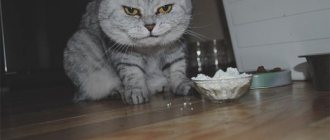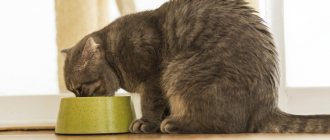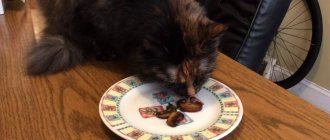7687Pavel
2
Owners of furry meowing pets may encounter any deviations or disturbances in the health of their pets. This deviation can be loose stools in cats, or, more simply, diarrhea. Can cats take Loperamide? – a question that arises among owners who urgently want to help their pet, but do not have suitable medications for animals in their veterinary medicine cabinet.
Diarrhea in cats can occur due to poisoning, poor diet, infection, parasites, allergies or gastrointestinal diseases. As a result of prolonged diarrhea, the cat becomes dehydrated, which threatens to impair blood circulation in the brain. For this reason, the alarming and dangerous symptom should be immediately eliminated, and Loperamide can help with this.
© shutterstock
Composition and properties
The drug Loperamidum consists of the active component - loperamide hydrochloride and such auxiliary ingredients as:
- talc;
- starch;
- food emulsifier E572;
- Aerosil;
- milk sugar.
The substances in the medicine have a depressing effect on peristalsis, namely, they slow down the movement of intestinal contents, retain feces and reduce the frequency of the urge to defecate. Loperamide begins to act within 60 minutes after the dose is taken. The maximum concentration in the blood is observed after 4 hours. The medication leaves the body with bile and feces.
Although Loperamidum is intended to treat humans, it is also often used in veterinary medicine when cats experience diarrhea due to gastrointestinal problems or other causes.
You can resort to taking the drug if the animal defecates very often.
But a cat can be given Loperamide only as a last resort, when the diarrhea is so severe that it can lead to dehydration, and other medications are powerless.
You should not treat diarrhea in a cat with this medication if stool problems are related to diet or allergic intolerance to any product. In this case, it is enough to put the purr on a special diet and eliminate the allergen.
Dosage of the drug
The next, very important nuance is the exact dosage. Since the drug is intended for humans, you will not find anything in the instructions for treating cats. The average dose for an adult cat is no more than 1/2 tablet per day; a kitten should not be given more than 1/4, and preferably no more than 1/8 tablet.
Loperamide is not recommended for use in kittens, since after taking the drug the pet cannot be fed for 24 hours, and a safe fasting diet for a kitten lasts up to 12 hours.
To accurately divide the tablet into doses, it must be dissolved in water. Grind the tablet into powder and pour it into the syringe. Then insert the plunger and draw in water. It is more convenient to use a 1 or 10 ml syringe (multiples of 10 units). Shake well to dissolve the powder; it is better to use warm water.
Use the plunger to release any excess medication from the syringe so that the plunger does not accidentally break off. Next, you need to carefully pour the resulting suspension into the kitten’s mouth, naturally without a needle. For each dose of the drug, you need to dilute a new tablet, but keep in mind that even one dose of Loperamide can greatly harm the kitten if the cause of diarrhea is not accurately determined.
Loperamide is not recommended for long-haired cats if there is a possibility that the symptoms are caused by hair accumulated in the stomach.
When is it used?
It is necessary to give a cat Loperamide for diarrhea only if the symptom threatens the pet with dehydration of the body, as a result of which blood circulation in the brain is disrupted. Therefore, veterinarians usually prescribe medicine for cats for prolonged dangerous diarrhea caused by dysbacteriosis or resulting from a sudden change in diet. Veterinarians also prescribe Loperamide for stool problems caused by bacterial and viral infections, as well as various diseases of the gastrointestinal tract.
What is Loperamide?
Loperamide is a drug for the symptomatic treatment of diarrhea. However, this is the abbreviated name for the substance loperamide hydrochloride, which is on the Model List of Essential Medicines compiled by the World Health Organization.
Did you know? « Loperamide
»
was developed in 1969 by employees of Janssen Pharmaceuticals.
This is an active substance that leads to the desired result in the treatment of diarrhea. The element is found in various drugs that are considered analogues and have an antidiarrheal effect.
How to give it to a cat?
The drug must be given to the animal, taking into account its weight.
Loperamide for animals should be prescribed by a veterinarian, who will select the dosage and limit the duration of the treatment course depending on the condition of the purr, its weight and the accompanying diagnosis of diarrhea. Usually the daily dose is calculated as follows: per 1 kg of weight 0.05-1 mg of medication. The duration of the treatment course is no more than 2 days, but if the cat is under the supervision of a veterinarian, the duration of therapy can be increased until the act of defecation is completely normalized.
Precautions for use
When using the drug, you must strictly observe precautions and adhere to the dosage prescribed by your doctor. The active substance of the drug has a negative effect not only on pathogenic microorganisms, but also on the natural intestinal microflora
That is why, if the drug is taken for too long, the body may develop a lack of active biological components of group B, in particular, thiamine, riboflavin and nicotinic acid.
Fthalazol should not be given to cats during pregnancy, as it can provoke serious allergies, vomiting, and fever, which, in turn, can lead to miscarriage or pathological disorders in the development of kittens.
Limitations and possible side symptoms
Kittens and older cats cannot be treated for diarrhea with Loperamide unless the true cause of frequent loose stools has been established. In addition, antidiarrheal medication is contraindicated in the following cases:
- allergic reaction to the components of the medication;
- kitten age up to 3 months;
- painful discomfort in the abdomen;
- poisoning with toxic substances of inorganic origin;
- ulcerative intestinal lesions;
- intestinal obstruction;
- pregnancy and lactation period;
- dysentery;
- increased intraocular pressure;
- impaired kidney activity;
- protrusion of the intestinal walls;
- constipation.
The drug should not be taken simultaneously with any antihistamines.
Particular caution should be taken when giving Loperamidum to your purr if other medications are taken at the same time, since the chance of developing side effects increases. For example, medicine for diarrhea can inhibit the action of other medications, which is extremely dangerous for the pet’s health. Therefore, it is better not to combine Loperamide with tranquilizers or antihistamines.
If the dosage is calculated correctly, the drug is well tolerated and does not provoke negative effects; an overdose is also unlikely. Otherwise, if your cat takes Loperamide, the following side effects will occur:
- inflammation of the pancreas, intestines;
- constipation;
- increased gas formation in the intestines and bloating;
- loss of appetite;
- depressed state, drowsiness;
- jumps in heart rate and breathing;
- dry mouth;
- abdominal cramps;
- obstruction and intestinal blockage.
If you observe a deterioration in your cat’s health and undesirable effects, you should immediately stop treatment and show your pet to a veterinarian.
Is it possible to give a cat Loperamide for diarrhea?
Loperamide is intended primarily for people. However, in some cases the drug can be given to animals, including cats. It is important to remember that diarrhea is not a disease, but a symptom. Initially, you need to cure the cause of its appearance. Diarrhea is often caused by poor diet. To alleviate the cat's condition, the use of medication is allowed. However, this should not be the only treatment.
First of all, enterosorbent and temporary refusal of food will get rid of the disease. In cases where diarrhea does not stop for a long time and is combined with vomiting, the presence of an infectious pathogen in the microflora is possible. However, it is impossible to make a diagnosis on your own; the cat must be shown to a veterinarian.
Important! If there are black impurities and blood in the cat's feces, it is prohibited to give Loperamide. Such symptoms indicate internal bleeding, the animal should be immediately shown to a veterinarian.
In case of diarrhea, it is quite difficult to bring the animal to the clinic due to involuntary defecation. It is in this case that it is permissible to give the cat medication. Loperamide may be prescribed by a veterinarian during treatment. This is a symptomatic auxiliary therapy that can alleviate the animal’s condition.
Overdose
Drowsiness in a fluffy is a symptom of a drug overdose.
The following symptoms indicate that a cat is receiving Loperamide in an increased dosage:
- drowsiness;
- lack of coordination;
- lethargy;
- excessive muscle tension;
- respiratory depression;
- disruption of the passage of intestinal contents through the gastrointestinal tract.
Basic characteristics
Have you seen the Imodium commercial on TV? If yes, then you already have an idea about the composition we are describing. In fact, this is a cheap analogue of the advertised brand. It is sold under the names Imodium/AD, Pepto Diarrhea Control, Kaopectate II Caplets. All this is the same thing. Differences in prices and manufacturer.
Available in the form of capsules, tablets and gel for oral use. Used to eliminate diarrhea and inflammatory diseases of the entire gastrointestinal tract. It has nothing in common with anti-inflammatory corticosteroids, although from a chemical point of view there are certain similarities.
The advantages include accessibility: you can buy it at any pharmacy. The action is based on the compound’s ability to inhibit intestinal motility, as a result of which the evacuation of feces is significantly slowed down. At the same time, the product simultaneously impedes the absorption of high-molecular substances of protein and inorganic nature. In Russian, water in the intestines will be absorbed, but toxins will not (but not everything is so good in practice).
Please note that this drug should be given to your pet for a maximum of two days. If no positive results are observed, we recommend that you contact the clinic immediately. Most likely, the diarrhea in this case is associated with something more serious than ordinary food intolerance or overeating. In addition, at the same time, we advise you to feed the cat exclusively with liquid broths, refusing more “serious” food.
Therapeutic diet for diarrhea
Do not give for at least 3 days:
- dairy products;
- white poultry meat, ground in a blender (not raw);
- baby food, for example, purees without dairy products;
- boiled rice in broth or water (although animals are reluctant to eat such food, you will have to almost force feed it).
It is allowed to feed the kitten pate or canned food with the correct composition. As a preventative measure, you can continue to give activated carbon for 2-3 days, and repeat preventive measures periodically (every three months).
Note! From exposure to activated carbon for preventive purposes, the animal’s stool may be specific, but gradually normalizes











